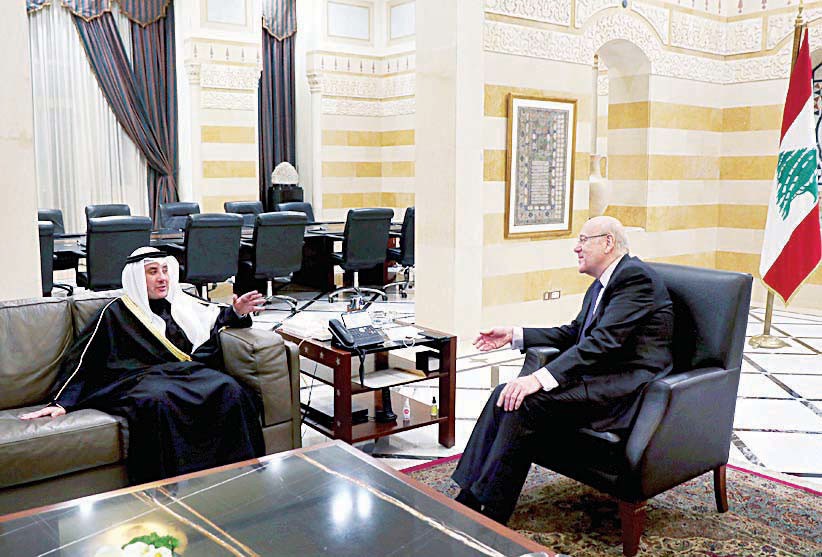23/01/2022
23/01/2022
BEIRUT, Jan 23, (Agencies): The visiting Kuwaiti Foreign Minister and Minister of State for Cabinet Affairs Sheikh Dr. Ahmad Nasser Al-Mohammad Al-Sabah affirmed on Sunday states’ aspirations not to see Lebanon turning into a “platform for any kind of offensive.” Emerging from a meeting with Lebanese President Michel Aoun at Baabda Palace, minister Sheikh Dr. Ahmad Nasser stated that he conveyed greetings from Their Highnesses the Amir and the Crown Prince to the Lebanese leadership.

The minister added that he conveyed messages from Arab and foreign states for rebuilding confidence in the country. “These ideas and proposals are based on resolutions of the international legitimacy and the Arab League,” Sheikh Dr. Ahmad Nasser said, declaring that he asked the Lebanese leadership to ensure that the country does not transform into “a platform for any rhetorical or actual offensive.” The minister indicated that the relayed proposals were not tantamount to intervention in Lebanon’s internal affairs.
Speaking at a news conference with the Lebanese Interior Minister Bassam Malwai, minister Sheikh Dr. Ahmad said he conveyed to the Lebanese leaders concerns of the leaders in Kuwait, the Gulf states and foreign states; firstly that Lebanon must not be exploited from any powers to wage rhetorical or actual offensives and secondly, the need to halt smuggling narcotics. The Kuwaiti minister indicated that his talks with his Lebanese host addressed measures by the Lebanese Interior Ministry to “put an end to this situation,” adding that he presented proposals to the Lebanese side to work out a more effective mechanism to abort the trafficking of drugs Minister Mawlawi for his part assured his Kuwaiti guest about the local authorities’ keenness on clamping down on any persons who stage stinging rhetorical campaigns against the GCC states. The crisis was triggered by remarks by Lebanese Information Minister George Kordahi in which he said in a televised interview that the war in Yemen was futile and called it an aggression by the Saudi-led coalition.
Following Kordahi’s televised comments, the kingdom recalled its ambassador from Beirut and banned all Lebanese imports, affecting hundreds of businesses and cutting off hundreds of millions in foreign currency to Lebanon. Several Arab countries followed Saudi Arabia’s step. Kordahi, who made his comments before taking his post, resigned in December, a move that did not lead to improved relations between the two sides. But the crisis goes deeper than Kordahi’s comments aired in late October. It is rooted in Saudi Arabia’s uneasiness over the rising infl uence of Iran in the region, including in Lebanon, once a traditional Saudi ally and recipient of financial assistance from the oil-rich kingdom. Sheikh Ahmed told reporters after meeting Prime Minister Najib Mikati that his visit to Beirut is part of international efforts for confi- dence building measures “with brotherly Lebanon.” He added that such steps for confidence building measures do not happen “overnight but they should be the result of tangible steps that are felt by all sides.” He added that based on that “things will move forward.”


